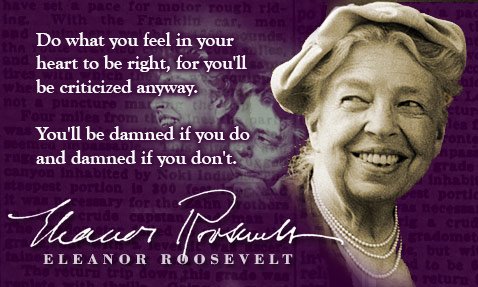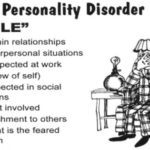“It is not the critic who counts; not the man who points out how the strong man stumbles, or where the doer of deeds could have done them better. The credit belongs to the man who is actually in the arena, whose face is marred by dust and sweat and blood; who strives valiantly; who errs, who comes short again and again, because there is no effort without error and shortcoming; but who does actually strive to do the deeds; who knows great enthusiasms, the great devotions; who spends himself in a worthy cause; who at the best knows in the end the triumph of high achievement, and who at the worst, if he fails, at least fails while daring greatly, so that his place shall never be with those cold and timid souls who neither know victory nor defeat.”
Theodore Roosevelt
Look at it objectively:
– Anybody worth something has and will always receive criticism so criticism is inevitable. The bigger the game you play, the more you will receive it. How you deal with it is what matters.
– All criticism is not bad. Even if it is negative criticism, can you find some positive feedback in it? So close the door to opinions and open yourself to facts. E.g. ‘you are always defiant of authority’ is an opinion so you can mentally add ‘my opinion’ to the start of their sentence. ‘You picked the wrong time to challenge that person’ is a fact. (See Understanding Boundaries)
– If more than one person says the same thing, look deeper and see if there is truth to it. If there is truth to it, notice how you are sensitive to this area and figure out why. Especially if you are being defensive as it validates accusation.
– If they are qualified, try to see their point of view. Don’t worry about the ‘experts’ who think they know how you should live your life.
– If it’s from someone who criticises no matter what, you can use them to practice patience, diplomacy and staying positive. Ignore them or you’ll add fuel to the fire.
– If they are the kind of people that need to tear others down to feel better about themselves then just smile, thank and avoid them. If you give them fuel for their fire they will keep coming back to you. These people need compassion because they have a low self-concept of themselves.
– You should say ‘thank you for your feedback’. If the person is being negative intentionally or criticising to hurt, this will throw them back.
– Remember if you are so focused on your why, your purpose, your life mission, you will not have time or energy to focus on the negativity.
– If you are being your own worst critic, practice the same and see it as feedback to get better. It is your rite of passage.
Sometimes critics just don’t see the world the way you see it – Bozoma Saint John

Steps to Accept Constructive Criticism
– Look past your initial reaction.
– Ask for suggestions on improvement.
– Thank them for their feedback.
– Distinguish between useful and useless criticism. Smile, thank, move on.
– Ask for time to address their concerns. It will show that you care and want to improve.

Thoughts:
– You think you feel bad because they misunderstand you and judge you incorrectly but in reality, you are judging them about their judging. They did not say what you expected or wanted them to say. You have given them your power even if their bad day is spilling over onto your reality.
– Critics are so critical because they don’t like something in themselves. So imagine putting value to criticism from someone who doesn’t like themselves or is critical of their own life.
– To give the light you must endure the burning.
– Your critic is your biggest fan. Don’t think about your critics, that is their job.
– People are entitled to their opinion, don’t try to control their words and stop being a critic of how they say things.
– Every moment you spend on critics is a moment taken away from you and the people who are counting on you.
– Critics only criticise the tall poppies they won’t go for smaller fish. It’s a compliment. All the greats faced a lot of criticism so it is a sign of growth and being of value.
– Reframe it as an opportunity to judo the situation. Leverage it.
– The nature of leadership includes getting criticism.
– People don’t throw stones at trees without fruit, they go for trees with fruit.
– Don’t get defensive. Get the point. Keep it productive and improve yourself!
– Look for it. What do I need to work on? You must be getting defensive because there is truth to it.
– Believe in yourself and do your best.
– Your inner critic is your worst critic.
– Expect to be attacked and don’t see it as attack, it’s feedback. The greater you get the greater the attack/feedback. Diamonds go through extreme heat and pressure. It’s your rite of passage. THE BIGGER GAME YOU PLAY THE BIGGER CRITICISM YOU RECEIVE. You don’t get criticism if you don’t do anything.
– Hurtful criticism mostly comes from those that have issues with themselves or trying to put you down because of jealousy or no self-worth.
– Are they justified, do they have a point or is it them? If it’s them it’s a personality disorder to attack. Could be their personality… remember to believe in yourself.
– Are they qualified example in graphics to know how it all works. Also have empathy on their not understanding it.
– Write it and don’t send it.
– YOU ARE THE ONE WHO CHOOSES HOW YOU REACT.
Negativity
1. Use the toddler technique – don’t give attention as they will cry. If you ignore they wont take it further usually.
2. Purposely misinterpret passive aggressive questions literally – Are you going to open a detective agency now? No I can’t afford it.
3. Answer their questions with vulnerability – Be genuine in your answer if it’s a legit thing.
4. Use the 1 sentence rebuttal – I guess if I were you I’d do that too.
5. Don’t recruit; live it – Don’t shove your ideas in others faces. Just be the example.
6. Find one other person – Someone is on the same path or journey.
Keep this note somewhere you will see it regularly e.g. mirror where you brush your teeth, opposite your toilet wall, phone wallpaper –
I am a good and worthwhile person whether or not this is true. I am completely independent of the good and bad opinion of others.
Questions and solutions you can provide:
– Are they aware that they come across as negative?
– What if we each write down some possible solutions and then share them?
– What does fault-finding mean to you or do for you?



